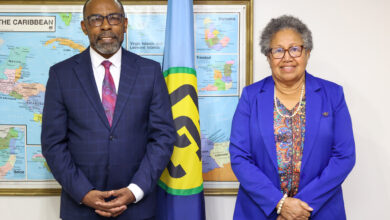Welcome
It is with profound pleasure that, on behalf of the Government and people of St. Kitts and Nevis, I welcome all of you to this first-ever High Level Forum on Reducing HIV/AIDS-related Stigma and Discrimination in the Caribbean.
Equally, on behalf of the CARICOM Community for which I have the honour to be Prime Minister with responsibility for Human Resources, Health and HIV/AIDS, I acknowledge with deepest gratitude the partnership of the Government of the United Kingdom through its Development Agency in the Caribbean (DFID) in supporting this Forum.
I also extend sincerest gratitude to the CARICOM Secretariat and the members of its Planning Committee for structuring such a meaningful programme, intent on making us all champions for change, championing the cause for the reduction of stigma and discrimination against people living with HIV/AIDS.
This Forum as Milestone in the Fight against HIV/AIDS
By any objective measure, this High Level Forum on Stigma and Discrimination must rank as a landmark event in the history of the response of the governments and people of the Caribbean to the bruising problem of HIV/AIDS that is threatening to overwhelm the region and reverse the hard earned development gains of the past 50 years.
This is a watershed event in that it has assembled in one place an unprecedented number of political leaders and policy makers at the highest decision-making level from within and without the region to address an issue that is at the core of prevention and treatment initiatives with respect to HIV/AIDS.
This Forum is signal in its importance by virtue of the fact that it has been able to garner support from an array of some of this region’s most revered and respected cultural and sporting icons as they lend the power of their tremendous personalities and their widespread influence to the fight against HIV/AIDS.
Indeed, history will ever record this Forum as a major milestone event in the dynamic of the regional response to the HIV/AIDS crisis given its geographical outreach, the quality and diversity of technical experts gathered, and the opportunity it affords for shaping regional policy on HIV/AIDS.
I believe that it is true to say that an assembly such as this one with its panorama of political, educational, medical legal, scientific, business, youth, sports, faith-based, governmental, non-governmental, and regional and international interests, all in the name of HIV/AIDS, is unprecedented in the experience of the Caribbean and perhaps elsewhere in the world.
Yet, for all of its novelty, this Forum cannot afford to lose sight of its central purpose, which is to identify culturally appropriate tools that may be applied to reducing HIV/AIDS-related stigma and discrimination in this region. The inescapable task of this Forum is to define the role of leadership in advocating for the reduction of HIV/AIDS-related stigma and discrimination and to develop a policy framework for purposive and sustained action. And we must not fail to deliver on this imperative!
Stigma and Discrimination – A Critical Barrier to Dismantle
Here in the Caribbean, as indeed in other parts of the world, stigma and discrimination remain a pervasive and debilitating impediment in the fight against HIV/AIDS. Indeed, the phenomenon persists as an immense barrier to voluntary counseling and testing, treatment, care and support – all of which are essential elements in a successful HIV/AIDS response effort.
In our Caribbean societies, the evidence of HIV/AIDS-related stigma and discrimination remain stark, nearly 20 years after we have been visited by the epidemic. And so, an indeterminate number of people living with HIV/AIDS still opt not to seek treatment, care and support, even when such assistance is within their grasp, immobilized by fear of stigma and discrimination. Still, people living with or suspected to be living with HIV/AIDS, all too often suffer the thinly veiled indifference of our health professionals and our health care systems.
Even now, people living with HIV/AIDS are shunned by friends and colleagues, evicted from their homes by their families, abandoned by their spouses, ostracized by their communities, denied employment opportunities and access to social benefits, turned down for insurance coverage or refused entry into other countries. The litany of intolerance against people living with HIV/AIDS is unending.
At the same time, self-stigmatization or the shame that people living with HIV/AIDS experience when they internalize the negative responses and reactions of others, is also very much in evidence in our Caribbean societies. Such self-stigmatization evokes feelings of despair and worthlessness, silences and saps the strength of already weakened individuals and, worst of all, acts as a huge deterrent to accessing treatment, care and support.
I submit that the combination of these powerful forces of intolerance, stigma and discrimination constitute one of the greatest barriers to preventing new cases of HIV infections, providing adequate care, support and treatment to people living with HIV/AIDS and alleviating the impact of the disease within our national and regional borders.
Making a Positive Attempt to Safeguard Human Rights
In this context, large segments of our societies across every stratum stand guilty of the violation of the human rights of persons living with HIV/AIDS. Our constitutions affirm that freedom from discrimination is a fundamental human right, founded on the principles of natural justice and are perpetual, but far too many of us stand in breach of this noble principle.
And so, the redemptive challenge before us now is to accept our failure, dig deep within our collective soul to find a new resolve, and to proceed apace to fashion innovative ways to reduce this blight, not only in the interest of the restoration of human dignity to a deprived group of people but, equally importantly, to reduce the spread and impact of HIV/AIDS in our societies.
In all of this, we must be mindful of the United Nations (UNGASS) Declaration of Commitment on HIV/AIDS that bears the imprint of our signatures. This Declaration states, inter alia, that by 2003 nations should enact, strengthen or enforce as appropriate, legislation, regulations and other measures to eliminate all forms of discrimination against people living with HIV/AIDS.
I am not sure how well we have done in the Caribbean in honouring this pledge that we made to the world and to our people some four years ago. However, a recent report of the UNAIDS estimates that close to 40% of the family of nations of the World Body still do not possess laws that protect persons from HIV/AIDS-related stigma and discrimination.
In this regard, I believe that this Forum presents us with another glorious opportunity for introspection and stocktaking and to take remedial action where indicated. In very practical terms, this may require a definition or redefinition of our strategic responses in the areas of law, ethics and human rights as they relate to HIV/AIDS-related stigma and discrimination. And it is our solemn duty to respond in requisite fashion.
One of the major programmes of the Caribbean Regional Strategic Framework of the Pan Caribbean Partnership against HIV/AIDS is to produce model legislation on stigma and discrimination, and we are now challenged to make the conversion from policy to practice, from rhetoric to reality.
Similarly, we have to be mindful of our pledge in Pan-Caribbean Partnership Commitment of February 2001 and the Nassau declaration of the same year to place the reduction of stigma and discrimination high on the list of activities, thereby guaranteeing that the health of the region translates fully into the wealth of the region.
The burden of this Forum, therefore, is not just about the analysis of the situation that confronts us but, more importantly, about charting a meaningful pathway that will lead to the reduction of HIV/AIDS-related stigma and discrimination, within the framework of the golden principles of human rights and human dignity.
Charting the Way Forward
Against this background, I wish to share some thoughts of my own on the matter. First of all, I believe that whatever measures are proposed by this Forum, they must seek to snap the links of the vicious cycle of HIV/AIDS-related stigma and discrimination, across the board. Such measures cannot be weak and apologetic, nor halting and unambiguous. Rather, they must be articulated in bold and emphatic terms, and intended to confront all segments and interest groups within our societies with candour and fortitude.
These measures must speak squarely to our political directorate and key policy makers on the outstanding legal issues to be addressed; they must face off with our professionals on the ethical standards and practices that are demanded of them in this new dispensation; they must challenge business and labour on inappropriate employment practices; they must insist that faith-based organizations hold fast to the tenet of the creed that commands that we do unto others as we would have them do unto us; they must interrogate the media on their agenda for social development; and they must shake civil society and community organizations out of their stance of indifference and hostility to people living with HIV/AIDS.
Secondly, I believe that this forum must find ways to assist persons living with HIV/AIDS to break their own silence about their condition and begin now to give the epidemic a face. Let me be clear here. I am not oblivious to the mountain of stigma and discrimination and social rejection that currently accompanies disclosure of sero-status. Neither am I insensitive as to the level of will power that people living with HIV/AIDS must summon to resist the surging tide of discrimination. However, at the same time, I believe that people living with HIV/IDS also owe it to themselves to shake off the fetter of self-discrimination and get on with their lives in a full and meaningful way.
I look forward to the day when, very soon, people living with HIV/AIDS will feel liberated enough to stand in line at any health facility in any of our countries to receive the treatment, care and support that they need, without any fear of intolerance or discrimination. I look forward to the day when children who are HIV positive can enjoy the benefits of a sound formal education without enduring the ugly emotional scarring that discrimination leaves in its wake. I look forward to the maturing of our societies to the point where one’s HIV status is no longer of any moment in our places of work and, but that the defining factor will be their technical competence and personal character.
Conclusion
And so this High-Level Forum on HIV/AIDS-related Stigma and Discrimination has its work cut out. Personally, I have great hopes for a most successful outcome and I know that the people of the Caribbean in whose name and with whose mandate we act, also look forward to a very productive meeting.




